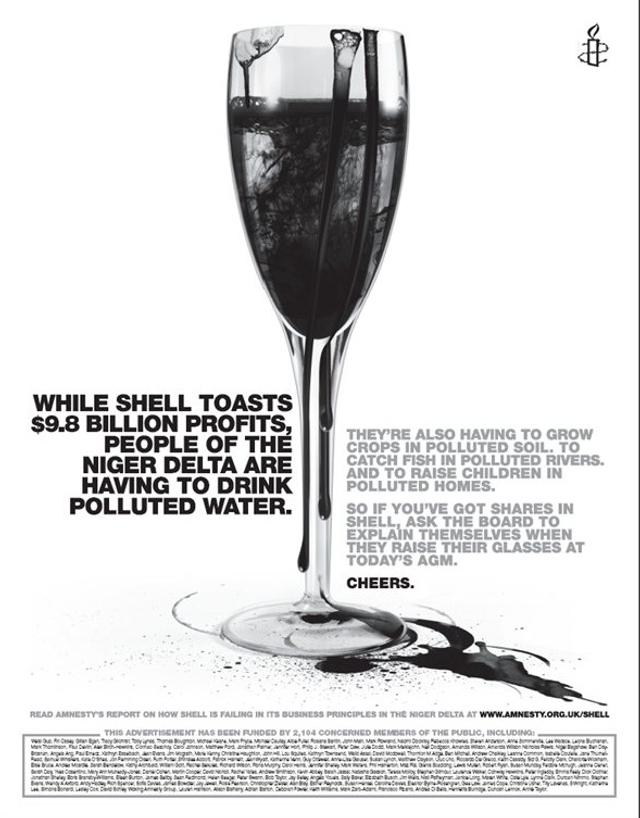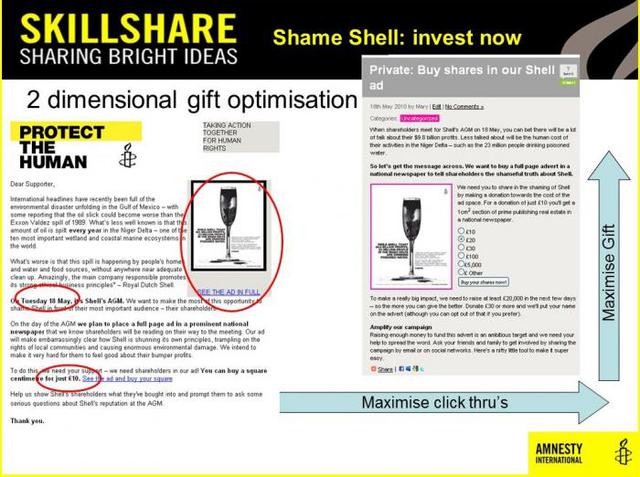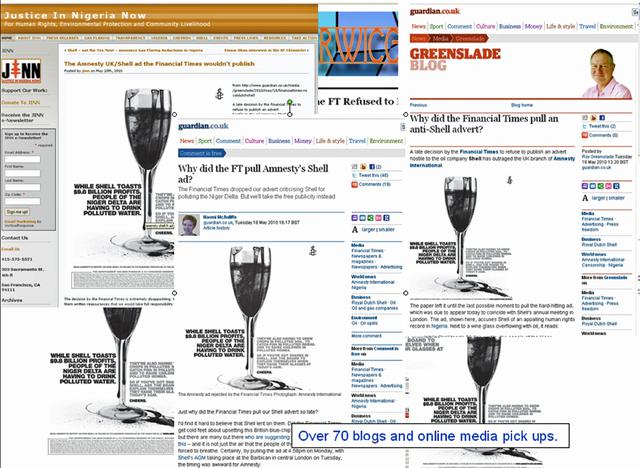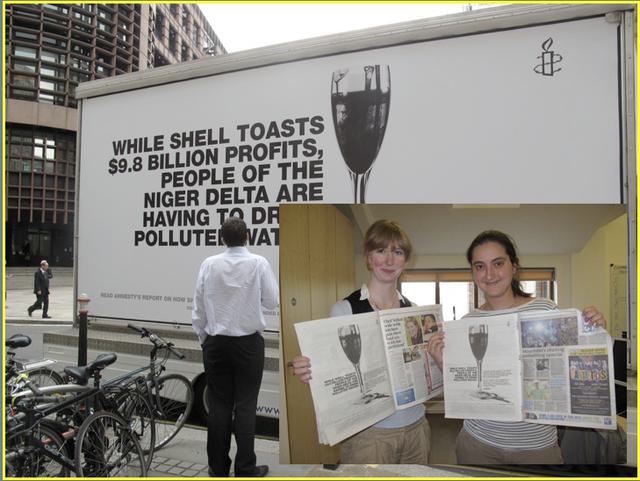Amnesty International: the shame Shell campaign
- Exhibited by
- Reuben Steains, Fundraising Innovations Manager, Amnesty International UK.
- Added
- August 25, 2010
- Medium of Communication
- Press advertising
- Target Audience
- Awareness
- Type of Charity
- Human rights & civil liberties
- Country of Origin
- UK
- Date of first appearance
- May, 2010
SOFII’s view
This is a really exciting exhibit. The shame Shell advert engaged both old and new supporters of Amnesty by giving them a clear role and a powerful voice throughout the campaign. It is also an excellent example of how a charity can integrate its fundraising aims and campaigning objectives into one urgent and compelling appeal.
Creator / originator
Reuben Steains, Amnesty International UK.
Summary / objectives
The main motivation behind the campaign was to shame Shell in front of their shareholders and to elicit engagement and a possible future agreement from the company. The campaign itself was designed to raise awareness and also to empower our supporters by giving them a clear role and a powerful voice. We aimed to raise £20,000 from over 1,250 people giving an average gift of £16. We also wanted 30 per cent of those donors to be new to the cause.
Background
Decades of pollution in the Niger Delta has led to serious human rights violations, driving the people of the region into poverty. With oil leaks and gas flaring, Shell is responsible for vast amounts of pollution in the region leading to millions of people drinking polluted water, growing crops in polluted soil and raising children in polluted homes.
Amnesty decided to run a high-profile advertising campaign to tell shareholders and other investors of Shell the truth on the day of their AGM. But we didn’t have the budgeted funds to run this campaign so we decided to put our faith in our supporters and ask them to donate the funds needed. We therefore launched an online fundraising and awareness campaign inviting people to buy a square centimetre of advertising space. This subsequently became our most successful online appeal.
As a campaigning organisation, Amnesty doesn’t normally have tangible appeals for our supporters to fund. Additionally most of our income is unrestricted. This campaign was a unique opportunity for our supporters - they knew exactly where their money was going.
Special characteristics
After creating the Shell advert, our first objective was to mobilise our online supporters to fund the cost of placing the advert in a prominent newspaper and to disseminate it as far as possible online.
We sent out an email to all our supporters, posted messages on social networking sites, seeded an online video appeal and sent out a press release inviting people to buy a square centimetre of newspaper advertising space for ten pounds. For three square centimetres (£30) donors could get their name at the bottom of the advert under a heading that read: ‘This advertisement has been funded by 2,104 concerned members of the public, including:’
It was important that people saw the advert beforehand and by sending it to our supporters; they also had something visual to send to their friends and share with their social networks.
On our website’s landing page, we encouraged people to share the message with their friends by having social network ‘share’ buttons enabling them to post the appeal on Twitter, Facebook, Myspace and Google. We had video content which brought to life the problems that people face every day in the Niger Delta. We also invited people to leave comments and engage in a lively debate on our blog pages. This provided us with direct donor feedback and we were able to respond immediately to any questions posed by our supporters.
We kept our supporters at the heart of the campaign by thanking and updating them on our progress. As we hit and then doubled our target income of £20,000, our donors were the first to hear the exciting news. We were then able to advertise in other newspapers, targeting more shareholders. We even employed a 48 hour sheet advan to drive around the location of the AGM and London’s financial district.
The advertising campaign was launched on the day of the Shell’s AGM. Images of campaigner holding newspapers displaying the adverts and of the advan driving around London were sent to our supporters. Additionally, the advan was tracked on Google maps, so supporters could see, in real-time, where the van was and what they had achieved. For every donor who had given £30 to get their name in the advert, we sent them a copy of the newspaper and a personal hand-written thank-you note from a campaigner.
Influence / impact
Shortly after the campaign, Shell announced that they were committing $2 billion to reducing gas flaring in the Niger Delta in coming years.
Results
The full advert was displayed online by over 70 media sites, including The Guardian, The Independent, various blogs and trade media. Over £40,000 was raised which exceeded the proposed financial target by 100 per cent. In total, 2,285 people donated an average gift of £17.65 and 32 per cent of those donors had not given to Amnesty International previously. The campaign allowed us to reactivate 91 donor relationships and also introduced 564 new supporters to the cause. The response to the Shell campaign on Twitter and Facebook was exceptional and created the biggest online ‘splash’ that we have ever had.
Merits
‘It's been one of those days when I really really love working here. It's been a fantastically joined up piece of work’—Tom Fyans, Head of Campaigns, Amnesty International, UK.
This innovative campaign seamlessly integrated our campaigning, activism and fundraising objectives into one successful appeal. Social networking sites and blogs were used extensively to successfully spread the messages of the campaign and the fundraising appeal to a wide range of supporters, both old and new. Most importantly, these supporters were held at the heart of the campaign. With regular updates, room for comments and discussions, the campaign was kept completely open and transparent for all of those involved.
 View original image
View original image
 View original image
View original image
 View original image
View original image

















